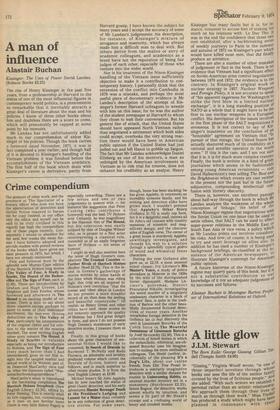A man of influence
Alastair Buchan
Kissinger: The Uses of Power David Landau (Robson Books £3.25)
The rise of Henry Kissinger in the past five years, from a professorship at Harvard to the status of one of the most influential figures in contemporary world politics, is a phenomenon so remarkable that it inevitably attracts a great deal of literature about the man and his policies. I know of three other books about him and doubtless there are a score to come, which will presumably be capped at some point by his memoirs.
Mr Landau has not unfortunately added much to our comprehension of either Kissinger or his policies. Though the book carries a foreword dated November, 1973, it was in fact completed a year earlier; and though half of it is devoted to Kissinger's handling of the Vietnam problem it was finished before the accomplishment of the Vietnam armistice. The first half of the book which deals with Kissinger's career is derivative, partly from Harvard gossip. I have known the subject for many years and I accept the accuracy of some of Mr Landau's judgements: his description, for instance, of Kissinger's mixture of arrogance and insecurity, which has always made him a difficult man to deal with. But others derive from the malice or envy of academic colleagues, and academics as a breed have not the reputation of being fair judges of each other, especially of those who venture into the wider world.
Nor is his treatment of the Nixon-Kissinger handling of the Vietnam issue sufficiently objective to make it a contribution to contemporary history. I. personally think that the extension of the conflict into Cambodia in 1970 was a mistake, and perhaps the most useful piece of documentary evidence is Mr Landau's description of the attempt of. Kissinger's former Harvard colleagues to wrestle with him on this issue; for he was the author of the student newspaper at Harvard to whom they chose to leak their conversation. But his general line of attack, that the United States should have appeased North Vietnam rather than negotiated a settlement which both sides could accept, overlooks the very strong reaction there would have been in American public opinion if the United States had just pulled out and left Hanoi to gobble up Saigon. The fact that Mr Landau acknowledges Daniel Ellsberg as one of his mentors, a man so unhinged by the American involvement in Vietnam as to risk trial for treason, does not enhance his credibility as an analyst. Henry
Kissinger has many faults but it is, for instance, nonsense to accuse him of staking too much on his relations with., Le Duc Tho. It was in the end the confidence that these two men established, after a backbreaking series of weekly journeys to Paris in the summer and autumn of 1972 on Kissinger's part which would have killed most men, that did finallY produce an armistice. There are also a number of other mistakes of judgement or fact in the book. There is no evidence that Vietnam had a significant effect on Soviet-American arms control negotiations between 1970 and 1972; the evidence is to the contrary. In Kissinger's original work on nuclear strategy in 1957, Nuclear Weapons and Foreign Policy, it is not accurate to speak of "his apparent eagerness for Washington to strike the first blow in a limited nuclear exchange", it is a long standing position ef NATO as a whole that it might have to be the first to use nuclear weapons in a European conflict. His description of the issues involved in the first phase of the SALT negotiations is erroneous. It is not correct to say of Kissinger's insistence on the conclusion of an "honorable" agreement on Vietnam that "In pursuit of that mirage, the United States has actually shattered much of its credibility as a rational and sensible operator in the world scene." If this is the case, and I am not sure that it is, it is for much more complex reasons. Finally, the book is written in a kind of grislY journalese which seems to be fashionable among young American revisionists — vide David Halberstram's best selling The Best and the Brightest-in which events are cast neither in the present nor the past but in the future subjunctive, compounding intellectual confusion with literary obscurity. There is, however, one excellent passage about half-way through the book in which Mr Landau analyses the weakness of the whole conception of 'linkage,' the belief of the Nixon-Kissinger regime that negotiations with the Soviet Union on one issue can be used to settle others, that SALT can be used to affect super-power relations in the Middle East or South East Asia or vice versa, a policy which as Mr Landau points out involves considerable risks. And now, of course, it is being used to try and exert leverage on allies also. In addition he has used a number of Kissinger's background briefings, de-classified at the insistence of the American newspapers, t° illustrate Kissinger's contempt for American public opinion. A future historian of the Nixon-Kissinger regime may quarry parts of this book. but it is not a substantial contribution to our, knowledge of it nor an adequate judgement or its successes and failures..
Alastair Buchan is Montague Burton Professor of International Relations at Oxford.


































 Previous page
Previous page